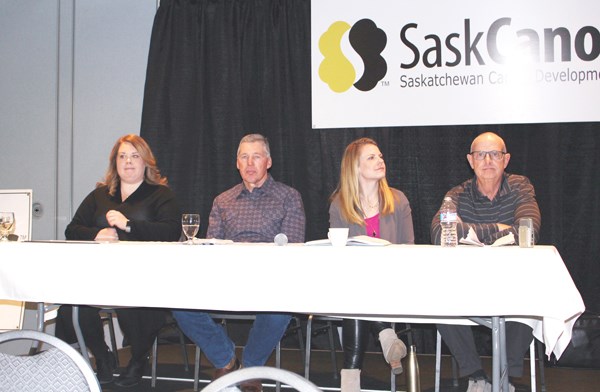Farming is a stressful business, and producers need to know how to deal with those stresses effectively.
Kim Keller, a farmer and co-founder of Saskatchewan Women in Agriculture said a University of Guelph study shows the level of stress being faced.
Keller told those attending a panel discussion the Farm Fitness and Finance Forum at the Grain Millers Harvest Showdown in Yorkton last week that the study showed 35 per cent of farm respondents faced depression, 42 per cent said they faced high stress on a daily basis and 58 per cent anxiety.
But perhaps the most concerning data was that 40 per cent also said they wouldn’t seek help, she said.
Keller said that resistance to find help has dire implications.
“In the (United) States farmers are twice as likely to commit suicide than the general public,” she said.
John McFadyen, executive director with Mobile Crisis Services picked up on the fact farmers often do not seek help. He related in Regina, Saskatoon and Prince Albert about 10 per cent of the local population calls the help line annually.
“The Farm Stress Line receives 300 calls a year,” he said, adding the line serves a rural population of 250,000, which means a far smaller number of callers on a percentage basis.
Keller said it is important the agricultural sector begin having greater dialogue regarding “the mental health struggles we is the agriculture industry deal with.”
It comes down to being willing to talk about the struggles which exist. In that regard she said it is positive “the amount of farmers who are stepping up and sharing their stories.”
Panelist Lesley Kelly of Watrous said she was taking part because it was time to bring the mental health of farmers to the forefront where it is talked about.
“I’m here because this conversation is so important,” she said.
Kelly said it is important to remember “we only have one mind to take care of, so take care of it.”
Mike Neilson is a rancher near Willowbrook. He told the conference he went through life threatening cancer and that created stress and impacted his mental health. He said it can come down to “a decision to be mentally well, to feel good about yourself … One main thing I had to learn … was to put myself first.”
McFadyen said it comes down to trying to stay on an even keel.
“We all have mental health … it’s a balance,” he said. “Stress happens in our lives that distracts us from our daily tasks.”
Such stresses can affect “how we perceive the world,” said McFadyen.
But Neilson said finding a balance when things are wearing on your mind is difficult, especially on a livestock farm.
“The cattle industry is a unique industry in that you really can’t take a break from your animals,” he said. “There’s no days off so to speak.”
Just listening is important.
“The most important thing we have in agriculture is each other,” said Keller, pointing to those attending the conference, those at home and those involved on the broader industry. She said, farmers listening to farmers is the critical thing. “No one else knows what a farmer goes through like another farmer.”
Neilson said listening is a huge step.
“Learn to listen to people,” he said, adding with communication “… we can give the farm community the skills to deal with it …
“We can all help out by learning more about mental health.”
That process did receive a boost during the panel discussion as Paul Moore of Yorkton Auction Centre took the microphone relating some of the stresses he himself has faced, and then pledged $10,000 a year for the next five years to fund efforts related to raising awareness and helping farmers deal with mental health issues.



